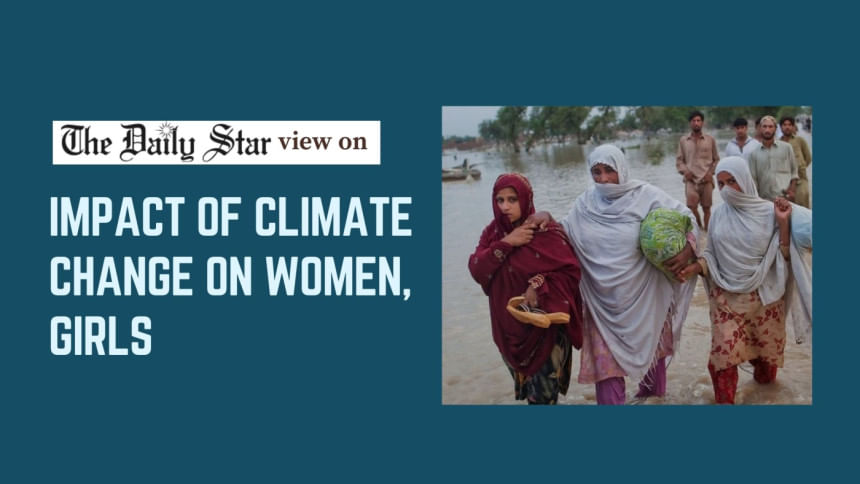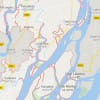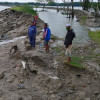Address climate change impact on women, girls

We cannot overstate the urgency of addressing the gendered impact of climate change in Bangladesh. A recent study has revealed alarming figures from climate-vulnerable districts like Khulna and Satkhira: over 60 percent of adolescent girls lack access to menstrual health products, only 2.5 percent of households have consistent access to sexual and reproductive health services, and 72 percent rely on unsafe, saline-contaminated drinking water. Beyond these gaps in basic needs, the climate crisis has also deepened gender inequalities in these areas. The same study found that 78 percent of women reported an increased risk of gender-based violence during disasters, while economic distress is fuelling child and early marriages. These trends are not only distressing but also a violation of fundamental human rights.
The study, conducted by Plan International Bangladesh, paints a grim picture of how climate emergencies intensify health, education, and security vulnerabilities. Girls are dropping out of school due to a lack of menstrual hygiene support or because they spend hours fetching water. Families, pushed to the brink by crop failures and job losses, are marrying off their daughters early or sending them into unsafe migration routes. Similar concerns were documented after Cyclone Amphan, when UN Women reported a 65 percent surge in gender-based violence, and ActionAid found that 71 percent of respondents experienced more abuse during disasters. Despite such evidence, national climate policies remain largely gender-neutral, ignoring these recurring and well-documented risks.
Therefore, the government must adopt a gender-responsive legal and policy framework to address these challenges. Current disaster management and climate laws and policies, including the Bangladesh Climate Change Strategy and Action Plan, 2009 and the Climate Change Trust Act, 2010, need urgent revision to incorporate protection for women and girls. Legislation should explicitly recognise gender-based violence, harassment, trafficking, and forced marriage as aggravated risks during displacement and disasters. Existing laws should be amended to cover climate-induced vulnerabilities, while mechanisms for victim support and speedy prosecutions must be strengthened.
On the ground, gender-sensitive infrastructure is essential. This includes safe, women-only cyclone shelters, secure water access points, and expanded menstrual hygiene management through schools and community networks. Disaster-prone areas must have access to reproductive and mental healthcare resources delivered by trained professionals, as well as social protection prioritising widows, single mothers, and women with disabilities. At the same time, investment in women-led adaptation initiatives, such as desalination projects and climate-smart agriculture, can help ensure livelihoods and reduce dependency on harmful coping strategies like early marriage.


 For all latest news, follow The Daily Star's Google News channel.
For all latest news, follow The Daily Star's Google News channel. 









Comments